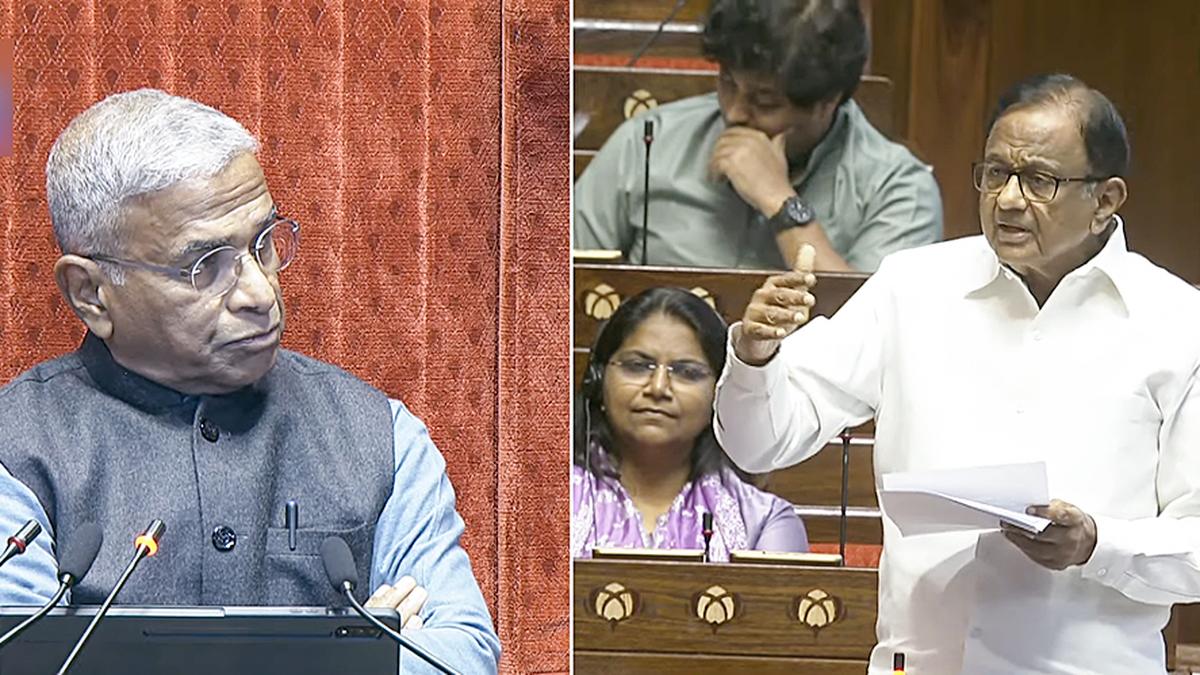
U.S. tariffs: Opposition slams Centre’s ‘inaction’
The Hindu
Opposition MPs raise the Trump tariffs issue during a discussion on the Appropriation and Finance Bills.
Expressing concern over the “tariff war” looming over the global economy after U.S. President Donald Trump’s recent announcement, Opposition members in the Rajya Sabha on Thursday (March 27, 2025) asked the Centre if it had any specific plans to deal with the threat.
The MPs raised the issue during a discussion on the Appropriation and Finance Bills. Senior Congress MP and former Finance Minister P. Chidambaram, who initiated the debate on the Bills, urged the Centre to clarify the country’s response to Mr. Trump’s statement that he would impose reciprocal tariffs on April 2, 2025.
He said the Centre should discuss the issue in Parliament or consult the Opposition parties on the matter. “What is the government’s response? What is India’s response? There has been no statement of policy, no discussion in Parliament, no consultation with Opposition parties. The government is holding its cards close to its chest, if it has any cards at all,” he said. He warned the government that a tariff war would lead to a trade war, hurting the whole world.
Addressing the members’ concerns, Union Finance Minister gave a detailed account of the recent reduction in basic customs duties and other tariffs, adding that these were not in response to Mr. Trump’s announcements. However, Mr. Chidambaram attributed it to the “Trump effect”.
Ms. Sitharaman said that by bringing down the customs duty or by removing it completely, the Centre was actually helping small and medium industries that import intermediary goods or raw materials, mainly for producing some goods, which they in turn export. “We have actually helped the manufacturing sector,” she said, adding that the Centre had used the opportunity to rationalise the tariff structure and address the duty inversion. “Through this, there will be more domestic value addition in industries, it will promote exports, facilitate trade and provide relief for common people,” she said.
She maintained that the Finance Bill proposes to remove seven customs tariff rates for industrial goods. “Two tranches of rationalisation of customs rate rationalisation has happened. They have reduced the number of tariff rates from 21 to eight, completely bringing them down – including the zero-rated ones. Many Indian exports will now become more competitive as the cost of imported inputs will be completely reduced,” the Minister said.
Either a cess or surcharge will be applicable per item, she said, citing the example of social welfare surcharge, which will be exempted on 84 tariff lines that are already subject to a cess. “Thirty-five additional capital goods for production of electric vehicles (EV) battery manufacturing and 28 additional capital goods for mobile phone battery are now being added to the exempted goods list. They are not going to be taxed any more. We will be enabling the production of EV and mobile phone batteries,” she said. Cobalt powder and waste, scrap of lithium iron battery, lead, zinc and 12 more critical minerals, in addition to 25 critical minerals, were fully exempted from basic customs duty in the Budget in July 2024.

 Run 3 Space | Play Space Running Game
Run 3 Space | Play Space Running Game Traffic Jam 3D | Online Racing Game
Traffic Jam 3D | Online Racing Game Duck Hunt | Play Old Classic Game
Duck Hunt | Play Old Classic Game











